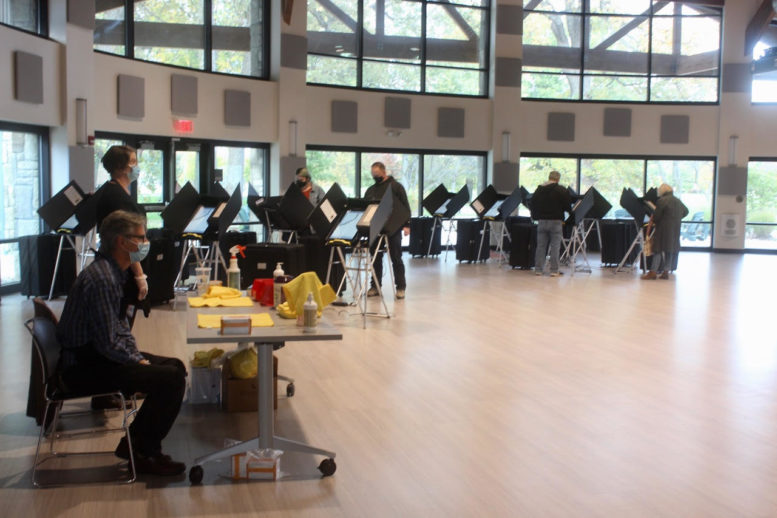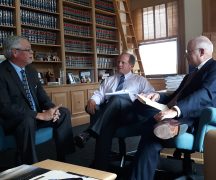BY SUSAN TEBBEN
Early voting is ongoing for the upcoming Aug. 8 special election on Issue 1 that asks voters to make it harder to amend the Ohio Constitution by raising the threshold to 60%.
To get to the ballot box, voters need to keep in mind changes made to voter ID laws last year, in a late-night legislative move approved by Gov. Mike DeWine at the beginning of 2023.
Those changes, made through House Bill 458, mean different identification allowed at the polls, and limits to the absentee ballot dates.
While a driver’s license with a different address is still allowed (as long as it’s not expired), voters must be registered with the Ohio Secretary of State at the correct address before voting.
Along with unexpired driver’s licenses, a state of Ohio ID card, interim ID form from the BMV, a US passport or passport card, US military ID card, Ohio National Guard ID or ID from the US Department of Veterans Affairs counts as valid photo identification.
Under the changes, voters can no longer use a Social Security card, birth certificate, insurance card, utility bill, bank statement, government check, paycheck or other government document, according to the Secretary of State. Even a “registration acknowledgment notice” from the county board of elections is no longer acceptable, according to the new rules.
As of April 7, those without a driver’s license from Ohio or any other state can obtain a photo ID through the Ohio Bureau of Motor Vehicles free of charge, an ID that can be used at the polls.
The deadline for absentee ballot applications is now Aug. 1 at 8:30 p.m., another change made by the legislature.
“Ballots now must be requested a full week before Election Day – the previous Tuesday by 5 p.m. – as opposed to the previous Saturday by noon (the previous deadline),” according to information sent out by the ACLU’s Ohio chapter.
Once voters have their absentee ballots, they must be received by the county board of elections four days after Election Day at the latest.
The last day of early voting, which was previously the Monday before Election Day, has been eliminated as well.
If on the day of election a voter files a provisional ballot, the “cure” window to reconcile the voter information has been reduced from seven days to four.
The changes were supported by GOP legislators and Gov. Mike DeWine in an attempt, they said, to increase election integrity in the state. Secretary of State Frank LaRose supported the move as well, despite having previously said Ohio election fraud was extremely rare and touting the state as foremost in its election integrity.
Democrats, along with groups like the League of Women Voters of Ohio, the AARP and ACLU of Ohio said the new voter ID laws were not only unwieldy, but wouldn’t make elections more secure.
“Make no mistake, these regressive changes were designed with little to no evidence to support them and to directly hinder turnout,” the ACLU said in a blog post explaining the changes.
Ironically, HB 458’s original intent was to eliminate most August elections, a GOP-supported measure back when the bill was passed due to the cost of an extra primary and the historically low turnout.
Since then, Republicans have backtracked, re-implementing the August election specifically for the purpose of Issue 1, the measure to require citizen-initiated ballot measures to have signatures in all 88 counties in the state and 60% voter approval. Current law requires 44 of 88 counties and 50% approval.
Also from Ohio Capital Journal:
Ohio House Republicans introduce law to ban drag shows outside of adult entertainment venues
BY: MORGAN TRAU
Two Ohio Republican lawmakers have introduced legislation that would ban drag performers from working anywhere that isn’t designated as an adult entertainment facility. The way the law is written, it would also appear to ban any theatrical performance where a character wears clothing opposite gender at birth.
House Bill 245 prohibits “adult cabaret performances in locations other than adult cabarets,” and adds to the definition of adult cabaret performances “performers or entertainers who exhibit a gender identity that is different from the performer’s or entertainer’s gender assigned at birth.” This means that drag queens and kings can only perform at places like an “adult” cabaret, an “adult” theater or a “sexual encounter establishment.”
It was introduced by state Reps. Angie King (R-Celina), Josh Williams (R-Oregon) and is co-sponsored by 41 other Republican House members. READ MORE




